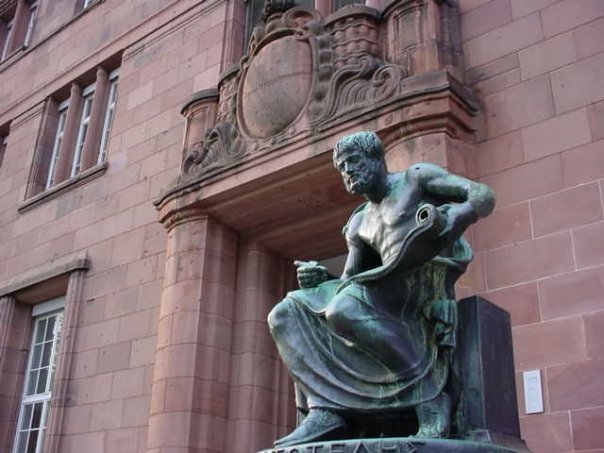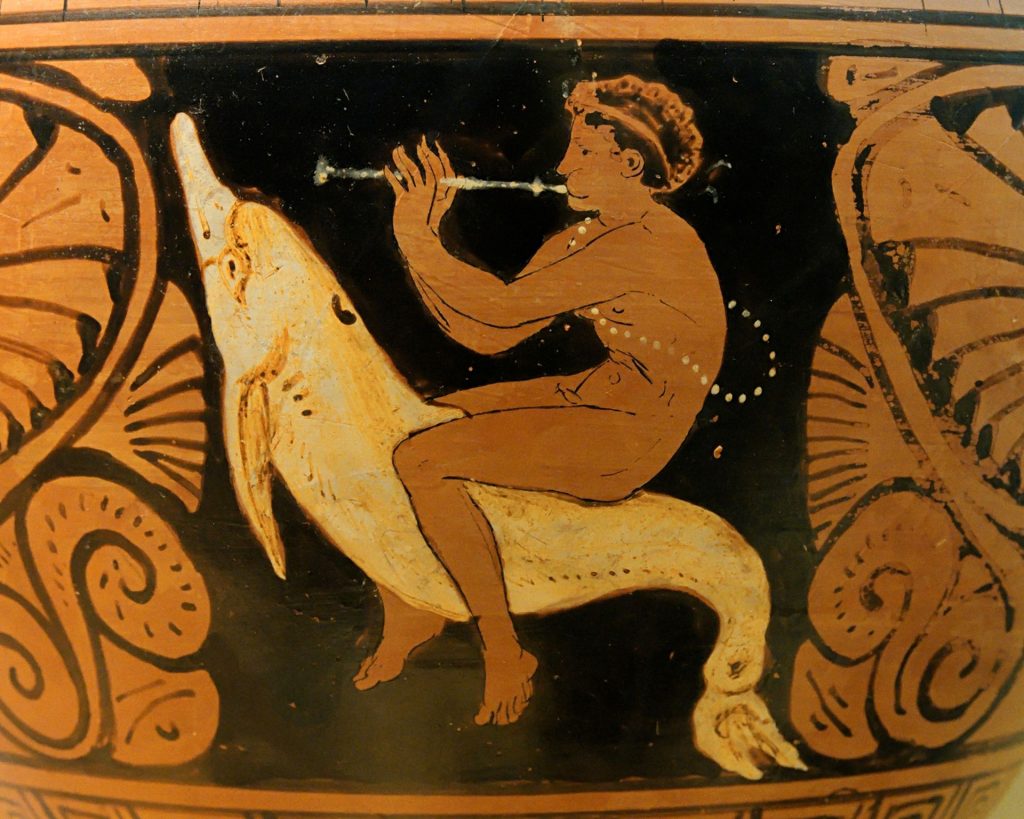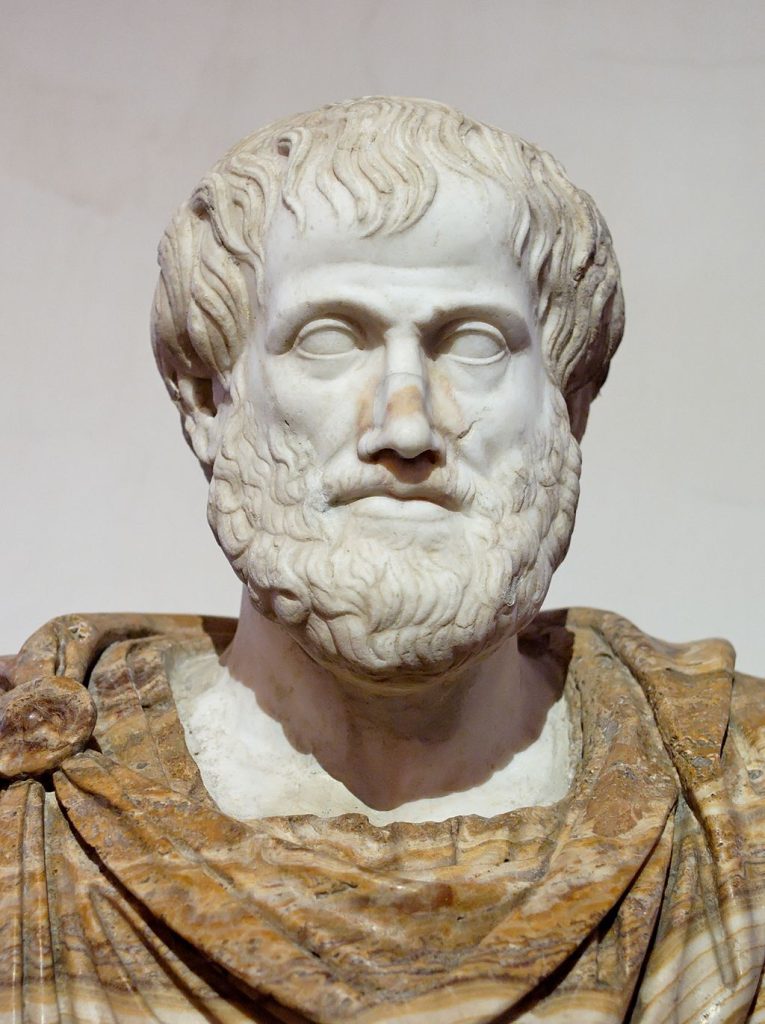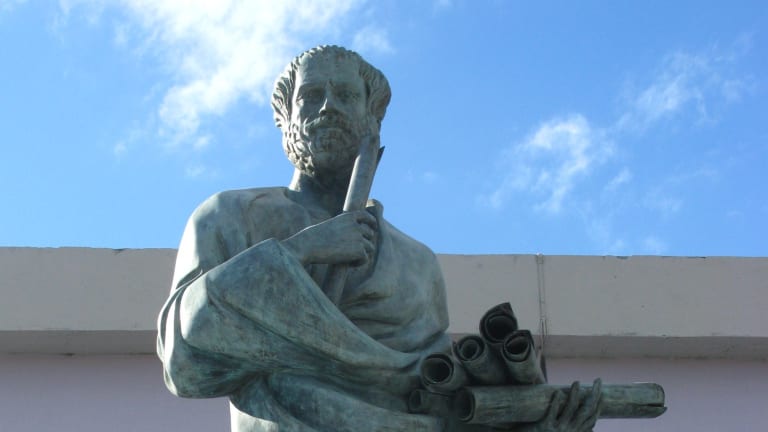Written by Van Bryan, Contributing Writer, Classical Wisdom
“For contemplation is both the highest form of activity (since the intellect is the highest thing in us, and the objects that it apprehends are the highest things that can be known), and also it is the most continuous because we are more capable of continuous contemplation than we are of any practical activity.” ~ Aristotle, Nicomachean Ethics
Our five-week-long inquiry into ancient moral philosophy naturally culminates with Aristotle and his philosophical text known as the Nicomachean Ethics. As we will see, Aristotle asserts ideas that are reminiscent of the Stoics, putting emphasis on attainment of virtue within our lives. However, unlike the Stoics, Aristotle does not rely on a divine cosmology to make his case. Instead, he leans heavily on formalized logic (something he is credited with discovering) and what might be considered a rudimentary form of the scientific method.
At the opening of Book X of the Nicomachean Ethics, Aristotle asks us “…what kind of thing is pleasure?” A notion that we might take for granted, it is very essential to Aristotle’s moral philosophy that we adequately answer this question.

Aristotle concludes that pleasure is not a process or a state of being. Instead, he asserts that pleasure is an activity, something that we do. More precisely, pleasure is the thing that completes an activity. The philosopher makes a point to say that pleasure completes an activity so long as the subject and the object of the activity are in a suitable condition.
If we were to examine a shipbuilder, for example, we would first have to conclude that the shipbuilder is appropriately healthy and suitably prepared to partake in the activity of shipbuilding. Also, we would have to be sure that the object of the activity (the ship) is constructed from appropriate materials that are in good condition. If we can conclude both of these things, then we can safely assume that the shipbuilder will be capable of building his ship; at the completion of this activity, there will be pleasure. A shipbuilder, insofar as he is a shipbuilder, will inevitably find pleasure in building ships.
So we have seen that pleasure is the natural end of an activity. Different people will certainly enjoy different activities more than others. The lover of philosophy will find the activity of philosophizing pleasurable, the lover of music will find music to be pleasurable, and so on.

Aristotle then tells us that life is an activity and, as is true with all activities, pleasure should be the natural end for life. Finding the appropriate pleasure for our lives means arriving at a happy life, which Aristotle believed was synonymous with a good life.
And so we seem to have concluded that finding the appropriate pleasure within our lives as human beings will lead us to happiness, which will lead us to a good life. But this, rather obviously, leads us to another question: What is the appropriate pleasure?
Recall that the hedonists believed bodily pleasures were our ticket to a happy life. Aristotle considers this but ultimately rejects the notion. Does it seem rational to say that all of our struggles, our fears, our hardships, and our miseries are suffered only so that we may eat and drink as much as we please? Aristotle thought such an idea implausible.
Aristotle also did not agree with the Ethical Egoists, who declared that a pleasurable life is one where we conquer our fellow man and assert ourselves above society. While some might find pleasure in this, Aristotle believed that certain pleasures were better than others. We should make a point to find these most perfect pleasures.

To do this, Aristotle asks us to imagine a hypothetical man who is perfect in every way imaginable. This ideal human would find pleasure in that which is most perfect. What is this pleasure that is most noble and honorable? Aristotle tells us that it is the active expression of virtue.
So…
A happy life and a good life are synonymous. We only find a happy life if we find our most appropriate pleasure as rational beings. Our most appropriate pleasure is the active expression of virtue. Finally, we must ask, which virtue is the truest, the most honorable, and the noblest? Believe it or not, not all virtues are created equal.
Aristotle makes a point that some virtues are self-sufficient while other virtues require external things in order for that virtue to be realized. For instance, generosity is only possible if we have an excess of resources and other citizens to receive our generosity. Justice, although important, requires other citizens to receive our just acts. Virtues such as these are not self-sufficient.
Then we arrive at wisdom, which requires nothing external to be realized. We may pursue wisdom for our own pleasure and we require nobody else to have this virtue realized. Additionally, learning is the one activity that we may consistently do throughout our lives. While variables may interfere with our abilities to be generous or just, there is no reason why we should ever stop pursuing wisdom.

Aristotle also appeals to the gods to make his case for a life in pursuit of wisdom. He states that the gods are most assuredly all-knowing, and so by pursuing a life of wisdom we come closer to the divine.
Aristotle does note that some may disagree with this, saying that we are mortal and should, therefore, think mortal thoughts; he dismisses these notions. Instead, the philosopher urges us not to settle for mediocrity. We ought to pursue that which is most important, most pleasurable, and most divine.
We must not listen to those who urge us to think human thoughts since we are human, and mortal thoughts since we are mortal; rather, we should as far as possible immortalize ourselves and do all we can to live according to the finest element within us—for if it is small in bulk, it is far greater than anything else in power and worth. ~ Nicomachean Ethics
You may now be realizing that Aristotle and the Stoics arrived at similar conclusions. Both tell us that a life in pursuit of wisdom is the best type of life. However, the Stoics believed that we ought to pursue wisdom for the sake of duty. Aristotle, rather simply, tells us that we ought to pursue wisdom because it will make us happiest. We need no other reason than this. Additionally, we need not accept the divine cosmology of the Stoics in order to live a good life. Aristotle’s philosophy is based upon systematic logic and empirical observations that many would agree with.

Therefore, it can be concluded that the Nicomachean Ethics is the most accessible and the most all-encompassing of the moral philosophies presented in this series. It remains a cornerstone of ancient ethical philosophy, leading those who might seek happiness toward enlightenment and a life well-lived.










One comment
That’s statement is so true. A person can only find happiness in live if he has evolved properly as a person in terms of his intellectual and emotional capacities.
One creates an angry dangerous person if one interferes with the development of a person or if one manipulates such growth in a person which is done in a general sense in Nazism (who had a Hitler Youth where such manipulation was done), Christianism (Christianity) where the youth is indoctrinated from a young age…and many such others…
If one damages someone like this and he realises what he should have been than there is a potential problem for the indoctrinators who actually violated such a person in their attempts to SOCIALLY ENGINEER him, or her, to fit into their oppressive ways…
Pieter J (PJ)
Our apologies, you must be logged in to post a comment.